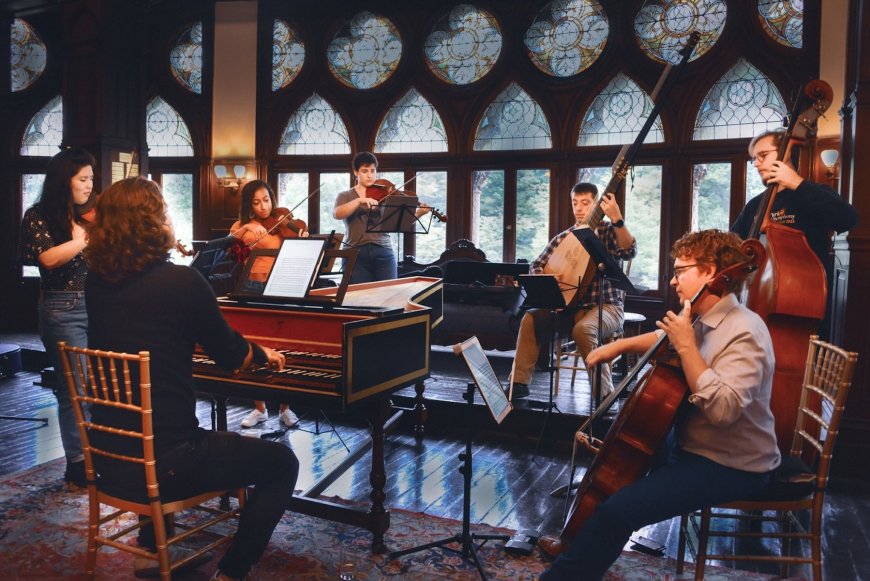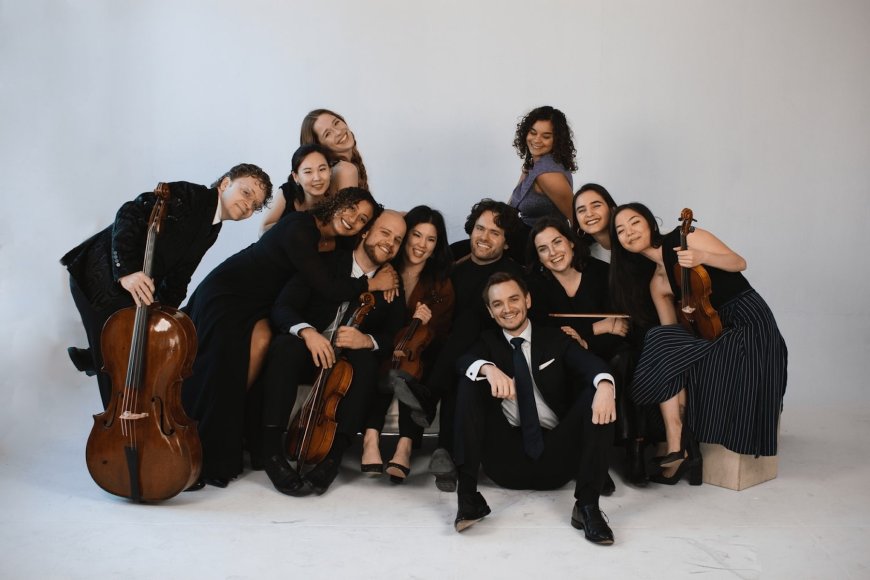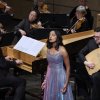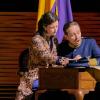
Drawing its name from Shakespeare’s comedy with its upside-down world of revelry, early music ensemble Twelfth Night played to an enthusiastic audience at UC Berkeley’s Hertz Hall on Sunday. The program was called All’Italiana and featured Baroque sonatas and songs “in the Italian style” by both Italians and the northerners who wanted in on the bold new music.
This fine group of young period musicians is “not your father’s Oldsmobile” — or, more aptly, not the previous generation’s Baroque playing. Any lingering reputation of Vivaldi and Handel as old fogeys was blown out of the water in the Cal Performances-sponsored concert.
The ensemble’s founders and directors, violinist Rachell Ellen Wong and keyboard player David Belkovski, were joined by four other instrumentalists — violinist Shelby Yamin, violist Andrew Gonzalez, cellist Andrew Koutroubas, and theorbist Adam Cockerham — and by soprano Nicoletta Berry.
The mood was electric from the get-go: passionate leaps from silence to sound; racehorse-fast swirls and scales; interjections of wildly contrasting dynamics and tempos. Crunchy Baroque dissonances and strange “color chords” flew through the hall like rockets.

With Twelfth Night’s youthful energy, star power, and forcefulness, I could almost imagine that they were channeling rock guitarist Jimi Hendrix — who actually did “inhabit” Handel for a while in the late 1960s, living in what is now called London’s Handel Hendrix House.
The concert opened with Antonio Vivaldi’s overture to the opera Il Giustino, a witchy mix of dark hauntings and eerie flame. At the close of the first half, Vivaldi's Violin Concerto in E Minor was a splendid vehicle for Wong’s flair, with her crisp upbow staccatos, lots of expressive slides, and a wild snippet of a cadenza at the end.
Sandwiched between Vivaldi’s pieces was music by Germans who became famous for works in the fiery Italian style — George Frideric Handel, who in his 20s honed his craft in Rome; the prolific and always surprising Georg Philipp Telemann; and the musically innovative Johann Friedrich Fasch, who was a candidate for the post that J.S. Bach ultimately received as cantor of the Thomaskirche in Leipzig.
Twelfth Night broke with conventional concert expectations by interrupting their Telemann sonata with Berry’s performance of an aria, made all the more surprising by her entry to the stage from a seat in the front row. Singing Handel’s “Se vago rio” (If a lovely stream) from his cantata Aminta e Fillide, Berry’s rich, plangent soprano echoed the harmonic and emotional tensions of the surrounding minor-key instrumental pieces.
The group’s full performance of Aminta e Fillide had to be canceled because of a vocalist’s illness. I hope in the future to hear Twelfth Night dig into this powerful work.
The second half began with Handel's Armida abbandonata, a three-aria cantata in the voice of the sorceress Armida, a character in Torquato Tasso’s 16th-century epic poem Jerusalem Delivered. Her dangerous magic bewitches the crusader Rinaldo until he wises up and leaves her. Berry gave it a fittingly powerful performance. With her strong high register and nimble delivery of the many rapid melismas (extended vocal runs on a single syllable), she brought an energy that fit well with the passionate playing of her instrumental colleagues. An expanded repertoire of theatrical gesture would have given her characterization even more dramatic range.
Twelfth Night performs with evident intentionality, pumping energy into almost every musical phrase. In each moment, the intensity was thrilling, but over the course of the two-hour concert it became a bit too much. In that light, the quiet Siciliana that ended Armida abbandonata with its graceful dance rhythm was a welcome respite from the concert’s prevailing mood of fast and furious.
The concert ended with a compelling concerto by the Neapolitan composer Francesco Durante, which morphed without pause into a brilliant aria, “Al dispetto di sorte crudele” (Despite my cruel fate), from Handel’s Aminta.
The group’s encore was a song by Domenico Mazzocchi, written a century before the rest of the program’s selections. I would love to hear this ensemble perform more of that mid-17th-century repertoire, music that is as free-flowing and exuberant as its bold musicians.




